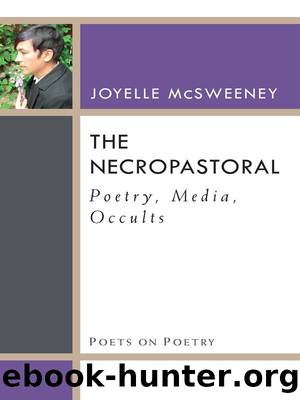The Necropastoral: Poetry, Media, Occults (Poets On Poetry) by Joyelle McSweeney

Author:Joyelle McSweeney [McSweeney, Joyelle]
Language: eng
Format: epub
ISBN: 9780472120741
Publisher: University of Michigan Press
Published: 2014-12-21T23:00:00+00:00
Analogous to the unimaginable labor of Johnsonâs unimaginable metaphysical poet, who nevertheless perversely executes diabolical, spasming, text effects, an unimagined reader is a kind of specter, produced, occultly, by a text that cannot imagine her and yet calls her into being by an ampersanding assemblage of continuities and discontinuities, a vertiginous pulsing cluster of exclusions and inclusions. The blubbering aspect of Muse & Drudge, its ampersanding violent, gibbering, gibbeting, ligatured production, might be seen as the signature of this violent yoking pulsation and withdrawal: âitâs rank it cranks you up / crash youâre fracked you suck / shucks youâre wack you be / all you cracked up to be.â13 In this passage, political force is massively depersonalized as âit.â The damaging extractive industrial practice of âfrackingâ is implicitly linked to the damaging impact of âcrackâ and âcrank,â as well as to the punitive regime of the War on Drugs, with its spectral personages of the Crack Whore and Welfare Queen. These onomatopoetic noun-verbsââcrank,â âcrash,â âfrack,â âsuck,â âcrackedââall packing an assonantly and rhythmically synchronized beating, all falling on the âyou.â Yet âyouâ is a notoriously fungible pronoun in poetry. It can refer to a singular or plural addressee, a specific person or a generalized yet informal and thus familiar âone.â âYouâ can even mask an âI,â a way for a speaker to refer to itself. Of course, in Mullenâs hands we have no way to stabilizing these surplus quantities of âyou.â Instead, âyouâ is like the jelly in the vise of these damaging verbs. This shattering discontinuity, this cracked-out violence and fracking, can damage but does not cancel the âyou.â âYouâ cannot escape this stanza. âYouâ keeps reappearing to register the damage. Elsewhere this spasming of sound has the opposite effect, creating a medium for staging spectacular conversion from negative to positive, a site where a shimmering, pulsating spectral presence may be configured, in Don Mee Choiâs phrase, as âpositively holey,â as when âbreaks wet thigh high stepper / bodacious butt shakes / rebellious riddem / older than black pepper.â14 It seems critical that this quatrain begins with no pronominal human subject, but in medias res, with a noun-verb, âbreaks.â âHigh stepperâ seems to supply a noun by force of idiom, but by line 2 no verb is supplied, only another statement, âbodacious butt shakes.â Now we must reread and wonder if âhigh stepperâ is masked possessiveâif the âhigh stepperâs / bodacious butt shakes.â The next line delivers us to ârebellious riddem / older than black pepper.â This answering couplet seems to me to be the correct and redemptive way to read this quatrain. Read all out of order, the quatrain supplies a ârebellious riddem,â a riddem that is itself embodied here thorough all the syllables and body parts it touches, a jellylike, resourceful flexing that is marked as political, ârebellious.â
In place of the dumbstruck reader of metaphysical verse imagined by Johnson, who considers the ride not worth the carriage, who cannot fathom through what perverseness of energy a text was
Download
This site does not store any files on its server. We only index and link to content provided by other sites. Please contact the content providers to delete copyright contents if any and email us, we'll remove relevant links or contents immediately.
The Universe of Us by Lang Leav(14359)
The Sun and Her Flowers by Rupi Kaur(13681)
Adultolescence by Gabbie Hanna(8138)
Whiskey Words & a Shovel II by r.h. Sin(7477)
Love Her Wild by Atticus(7226)
Smoke & Mirrors by Michael Faudet(5506)
Wiseguy by Nicholas Pileggi(4583)
The Princess Saves Herself in This One by Amanda Lovelace(4504)
Love & Misadventure by Lang Leav(4352)
Milk and Honey by Rupi Kaur(4224)
Memories by Lang Leav(4166)
Good morning to Goodnight by Eleni Kaur(3803)
Bluets by Maggie Nelson(3705)
Too Much and Not the Mood by Durga Chew-Bose(3690)
Algedonic by r.h. Sin(3494)
Pillow Thoughts by Courtney Peppernell(3385)
The Poetry of Pablo Neruda by Pablo Neruda(3358)
HER II by Pierre Alex Jeanty(3167)
Stuff I've Been Feeling Lately by Alicia Cook(3052)
